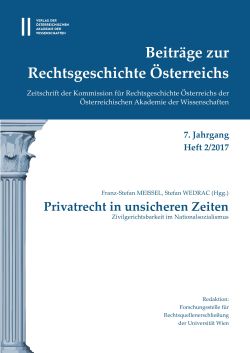

Beiträge zur Rechtsgeschichte Österreichs 2 / 2017, pp. 281-301, 2017/12/20
Privatrecht in unsicheren Zeiten
Zivilgerichtsbarkeit im Nationalsozialismus

National Socialists regarded families as “germ cell(s) of the nation”. Marriages had to serve the nation and guarantee for the future of the ‘Aryan race’. Therefore, family law was of particular interest to the National Socialists. Although the Austrian General Civil Code (ABGB) remained in force throughout the Nazi era, parts of the Austrian jurisdiction included the racial aspects of the Nazi ideology into their verdicts as soon as the National Socialists had come into power. Judges resorted to s. 115 ABGB to separate intermarriages and argued that the racial differences between the spouses had caused their “insurmountable differences”. The divorce of intermarriages was not regulated in the Marriage Act 1938, although the ‘Nazi jurisdiction’ referred to s. 37 Marriage Act 1938 to separate “undesirable intermarriages”. However, the files on which the research is based showed no consistent judicial practice. The verdicts used for and/or referred to in the article were processed in the course of the FWF funded research project “Privatrecht in unsicheren Zeiten – Österreichische Zivilrechtsjudikatur unter der NS Herrschaft”, headed by Univ. Prof. Dr. Franz Stefan Meissel.
Keywords: annulment – divorce – intermarriage – judicial practice – Marriage Act 1938 – racial differences – World War II